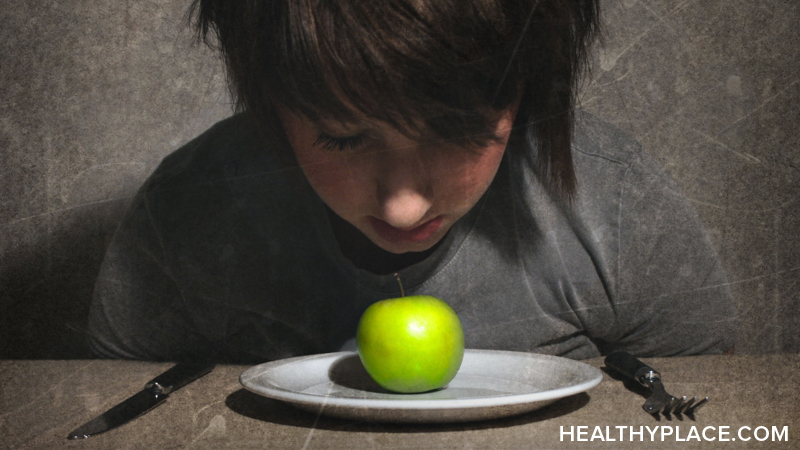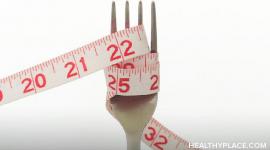Eating Disorder Symptoms

Eating disorder symptoms range from obvious physical and behavioral changes to more subtle changes in attitudes. It's important to know the signs of eating disorders to catch and get treatment for eating disorders as soon as possible. A person need not have all of the symptoms of an eating disorder to be diagnosed with one.
Eating Disorder Symptoms: Anorexia Nervosa
The most common symptom of anorexia is weight loss. Physiological eating disorder symptoms of anorexia include:
- Weight loss - often in a short period of time; at least 15% of original weight; less than 85% of the anorexic's medical ideal weight
- Cessation of menstruation (amenorrhea)
- Paleness
- Feeling cold / low body temperature
- Dizziness and fainting spells / low blood pressure (hypotension)
- Bone mineral loss, leading to osteoporosis
- Irregular/slow heartbeat (bradycardia), leading to cardiac arrest
- Hair loss, but with a possible thin, downy covering of hair on the extremities
- Dry skin
- Vitamin and mineral deficiencies / abnormal blood counts
- Swelling of arms and legs
- Constipation
- Dehydration
Outward actions are some of the symptoms of eating disorders on which families can pick up. There are some easily noticed behaviors like restrictive eating, fasting, or odd food rituals. Other behavioral symptoms of anorexia include:
- Avoidance of social situations where food may be present
- Compulsive exercise
- Dressing in layers to hide weight loss or keep warm
- Distortion of body image (seeing self as fat even when emaciated)
- Intense fear of becoming fat, regardless of low weight
- Use of laxatives, enemas, or diuretics
- The preoccupation in food/interest in cooking and feeding others
- Flat affect in voice
- Insomnia
Changes in attitude are commonly seen as one of the symptoms of anorexia. While the most common symptom is a refusal to eat and a denial of hunger, other attitude shifts that can be a symptom of anorexia include:
- Mood shifts / depression / anxiety / irritability
- Perfectionistic attitude
- Insecurities about capabilities regardless of actual performance
- Self-worth is determined by food intake
- Over-reliance on others
- Social isolation
- Reduced interest in sex
From Surviving an Eating Disorder. Siegel. M. et al (1988). Harper and Row and from American Anorexia Bulimia Association, Facts on Eating Disorders. Additional material provided by the Mayo Clinic.
More anorexia information.
Eating Disorder Symptoms: Bulimia Nervosa
Unlike anorexia, the eating disorder symptom of weight loss may not appear in the bulimia patient as the person may be under, over, or normal weight. Physical changes include:
- Swollen glands, puffiness in the cheeks, or broken vessels under the eyes
- Sores, scars or calluses on the knuckles or hands
- Sore throat/difficulty swallowing
- Dizziness / lightheadedness / heart palpitations
- Abdominal pain / abnormal bowel functioning
- Fatigue and muscle ache
- Unexplained tooth decay
- Frequent weight fluctuations
- Dehydration/electrolyte imbalance, leading to irregular heartbeat, possibly cardiac arrest
- Cessation of menstruation (amenorrhea)
Behavioral eating disorder symptoms can often be seen in cases of bulimia: bingeing on typically high-fat food, and purging, often vomiting. Bulimic behaviors include:
- Secretive eating (missing food)
- Avoidance of restaurants, planned meals or social events if food is present
- Self-disgust when too much has been eaten
- Bathroom visits during or after meals
- The use of diet pills / diuretics / laxatives
- Rigid and harsh exercise regimes
- Fear of being fat, regardless of weight
- Bingeing that may alternate with fasting
- Preoccupation / constant talk about food or weight
- Shoplifting (sometimes for food or laxatives)
Bulimia signs also encompass specific attitudes that may be new or existing. One of the primary eating disorder symptoms is feeling out of control. Other attitudes of the bulimic include:
- Mood shifts / depression / sadness / guilt / anxiety / self-hatred
- Severe self-criticism
- The need for approval
- Self-worth determined by weight
From Surviving an Eating Disorder. Siegel. M. et al (1988). Harper and Row and from American Anorexia Bulimia Association, Facts on Eating Disorders. Additional information provided by the Mayo Clinic.
More bulimia information.
Eating Disorder Symptoms: Binge Eating Disorder
Physiological eating disorder symptoms for binge eating can be difficult to separate from simple overeating, but any significant weight gain should be assessed by a professional. Physical symptoms of binge eating include:
- Weight-related hypertension or fatigue
- High cholesterol
- Diabetes
- Heart Disease
Behavioral symptoms for binge eating are sometimes obvious, such as eating large amounts of food (bingeing) or eating rapidly, but can also be well-hidden. Binge eating behaviors include:
- Eating when full
- Restriction of activities because of embarrassment about weight
- Going from one diet to the next
- Eating small amounts in public or dieting while maintaining a high weight
- Frequently eating alone
Attitude shifts, like fantasizing about being thin, can be symptoms of eating disorders. Attitude-related symptoms include:
- Self-worth based on weight and control of eating
- Feeling that eating is out of control
- Depression/anxiety
- Guilt/shame/disgusted by eating behaviors
More information on binge eating disorder.
You can read more about symptoms of these other types of eating disorders here:
APA Reference
Tracy, N.
(2022, January 4). Eating Disorder Symptoms, HealthyPlace. Retrieved
on 2026, January 14 from https://www.healthyplace.com/eating-disorders/eating-disorders-overview/eating-disorder-symptoms


